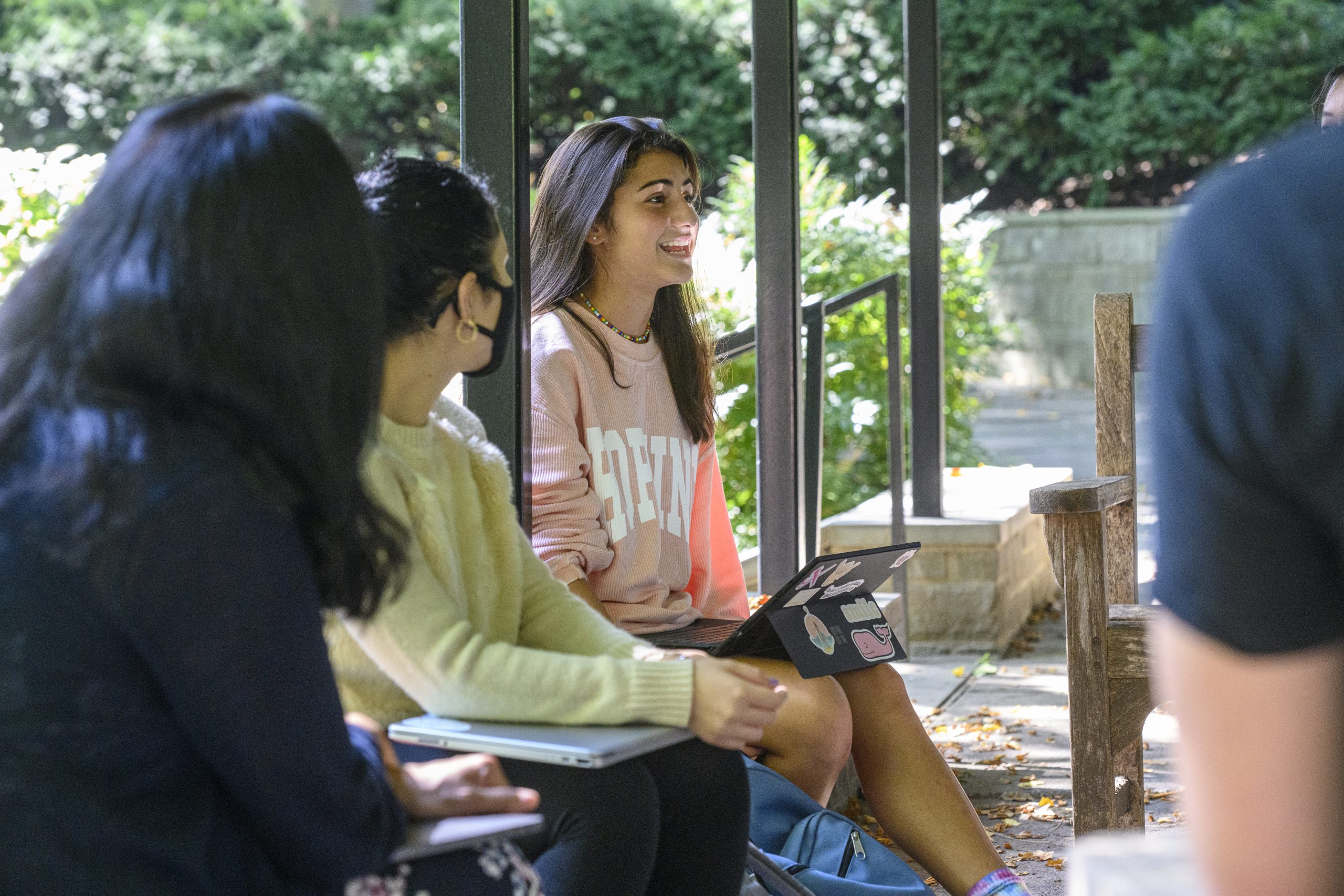To be eligible for transfer credit, an approved course must be taken at an approved college and completed with a grade of C or better.
We don’t require transfer students to have taken any specific courses in the past. Instead, we offer general guidelines to prepare you for a successful transition. As part of our application review process, we evaluate your courses from other schools and institutions. If you’re admitted, you’ll receive a preliminary assessment that shows an estimate of your accepted credits. Once you enroll, you’ll begin an official credit evaluation.
Transfer Credit Guidelines
Choose a tab below for more information about our transfer credit policies. While these don’t replace our official credit evaluation, you can use them as general guidelines during the transfer process. Understanding our transfer credit policies can make the transfer process easier for you and your family.
General Guidelines for Transferring Credits
Visit your undergraduate department website or the academic catalogue in the Krieger School of Arts & Sciences or Whiting School of Engineering to learn more about the courses our students take.
General Transfer Credit Policies
Open
Close
- Generally, your credits will transfer if they’re from an approved course, taken at an approved college, and completed with a grade of C or better.
- Pass/fail and ungraded courses may receive credit, as long as your school provides a written statement that your mark represents a grade of C or better.
- You may receive a maximum of 6 credits for courses in areas that aren’t covered by programs at Hopkins.
Krieger School of Arts & Sciences Transfer Credit Policies
Open
Close
NATURAL SCIENCES
- A math course at the Calculus I level (or higher) and an introductory and intermediate science course with a lab in a related field.
- Additional introductory and intermediate science courses with labs (if you’re a junior transfer student).
SOCIAL AND BEHAVIORAL SCIENCES
- A math course at the statistics or calculus level, and at least one prior course in a related field.
HUMANITIES
- At least one prior course in a related field.
Whiting School of Engineering Transfer Credit Policies
Open
Close
General Guidelines for All Engineering Majors
- Introductory and intermediate courses in calculus, chemistry, and physics with labs.
Junior Transfers
- Advanced courses in higher levels of mathematics, such as Calculus III, Linear Algebra, or Differential Equations.
- Major-specific courses to demonstrate your readiness in the engineering discipline.
Non-Transferable Courses
We’ll review the below courses on a case-by-case basis and notify you if your courses are eligible for transfer credits.
Physical Education or Personal Health and Wellness Courses
Open
Close
A maximum of 6 credits in the fields of nutrition, dietetics, or kinesiology, if these courses were part of a curriculum leading to a college degree.
College Orientation, Study Skills, or Career Development Courses
Open
Close
Courses that are in-depth studies of career paths within a field of study, and psychology courses in career counseling or learning theory.
Math Courses Below the Pre-Calculus Level
Open
Close
Most introductory statistics courses, and one course designed to review all necessary background for calculus, including the rate of change of a function.
Theology Courses
Open
Close
Comparative religion courses or other religion courses that study religion from an academic viewpoint.
Developmental English or English as a Second Language
Open
Close
First-year student composition courses (but not developmental English composition or ESL courses).
Computer Software Courses
Open
Close
Courses that teach some use of software, internet design and security, basic programming in HTML or Java, computer aided-design or introduce field-specific software programs.
Independent Study, Research, or Internship
Open
Close
Hybrid courses that include lectures and graded assignments along with practical experiences.
Trade Skill Courses
Open
Close
We’re unable to transfer courses that are part of an educational program leading to a specific trade, like automotive repair, culinary arts, and similar courses.
School Partnerships
We partner with the State of Maryland to ease the process of transferring into certain programs.
Computer and Electrical Engineering
Open
Close
The Whiting School of Engineering participates in a program developed by the State of Maryland to ease the process of transferring into computer and electrical engineering programs as a junior. If you complete two years of study and are awarded a state-approved Associate of Science in Engineering (ASE) degree from a Maryland community college, you’ll be evaluated for admission to Hopkins under the standard transfer student process. Admission to Hopkins is competitive and not guaranteed.
If you’re admitted under this program and pursue a B.S. in Electrical Engineering or a B.S. in Computer Engineering, Hopkins will accept your ASE as a block of credits totaling at least 60 credits. The Electrical and Computer Engineering programs at Hopkins have a specific “breadth and depth” requirement as part of the broader humanities/social sciences distribution requirements. Courses taken as part of the ASE will not count towards the “depth” component, as it requires some coursework be completed at the upper level.
Credit Transfer FAQs
Below, you’ll find answers to frequently asked questions about the transfer credit process. If you have a question and don’t see it here, reach out to transfers@jhu.edu.
Do my courses have to match a course taught at Hopkins?
Open
Close
Transfer courses don’t have to match existing Hopkins courses, but transfer courses should cover topics that are broadly defined as part of the Hopkins curriculum. For example, we do not regularly offer a course on science-fiction films. But since this is a film studies course and we have a major in Film and Media Studies, this course would likely be eligible for transfer.
Who determines if my credits are transferable?
Open
Close
Advisers from the appropriate Hopkins advising office, along with faculty members, determine which courses are eligible for transfer credit toward the number of credits required for graduation.
How many credits can I transfer?
Open
Close
Arts and Sciences transfer students are allowed to transfer up to 60 credits initially. Engineering transfer students are allowed to transfer a higher number if necessary. Please keep in mind that we require transfer students to complete 60 credits at Hopkins.
Can I transfer more credits later?
Open
Close
After starting at Hopkins, you can transfer up to an additional 12 credits (following the same guidelines as if you’d matriculated as a first-year student). Even with these additional credits, we still require that you complete 60 credits at Hopkins.
When will I receive an evaluation of my transferrable credits?
Open
Close
If you’re admitted, you’ll receive a preliminary credit assessment with your offer of admission. Once you enroll, you’ll be required to submit course descriptions and/or syllabi to the appropriate advising office to begin your official credit evaluation. We’ll provide additional information to help you through this process.
Will I receive credits for AP/IB/A-Level tests?
Open
Close
If you have an official score report sent directly from the College Board or another agency, we’ll award you credit for the exam scores that we accept. Learn more about our external credit policies in the latest Academic Catalogue.
Can writing-intensive courses transfer?
Open
Close
As part of the transfer evaluation process, you’ll receive guidance about the process for transferring writing-intensive courses.
How will the credits I have earned at my current school be evaluated?
Open
Close
Credit evaluations are performed by the Office of Academic Advising (Arts and Sciences) or the Office of Academic Affairs (Engineering). If you’re admitted, you’ll get a preliminary credit assessment on your decision release site. To receive credit for courses, we require a grade of C or better in courses comparable in content to those offered at Hopkins. Only courses from an accredited college or university are accepted. One of our academic advisers will finalize your credit evaluation after you’ve officially accepted your spot at the university.
We have a list of application deadlines, requirements, and resources to help you through the transfer process.
LEARN MORE ABOUT DEADLINES & REQUIREMENTS
Find answers to our most common questions about the transfer process, application requirements, and applying for financial aid.
VIEW TRANSFER FAQS


